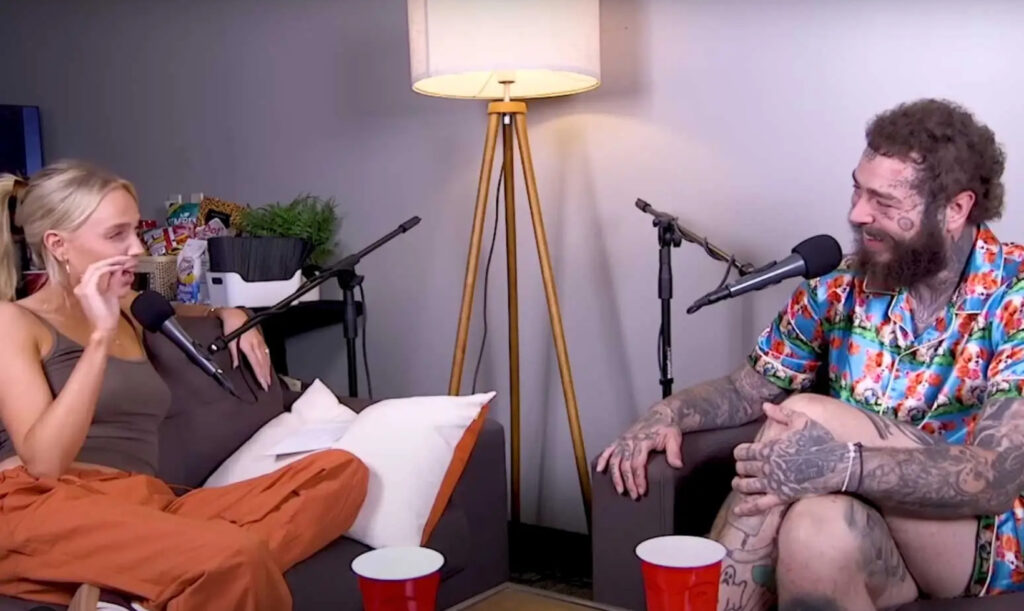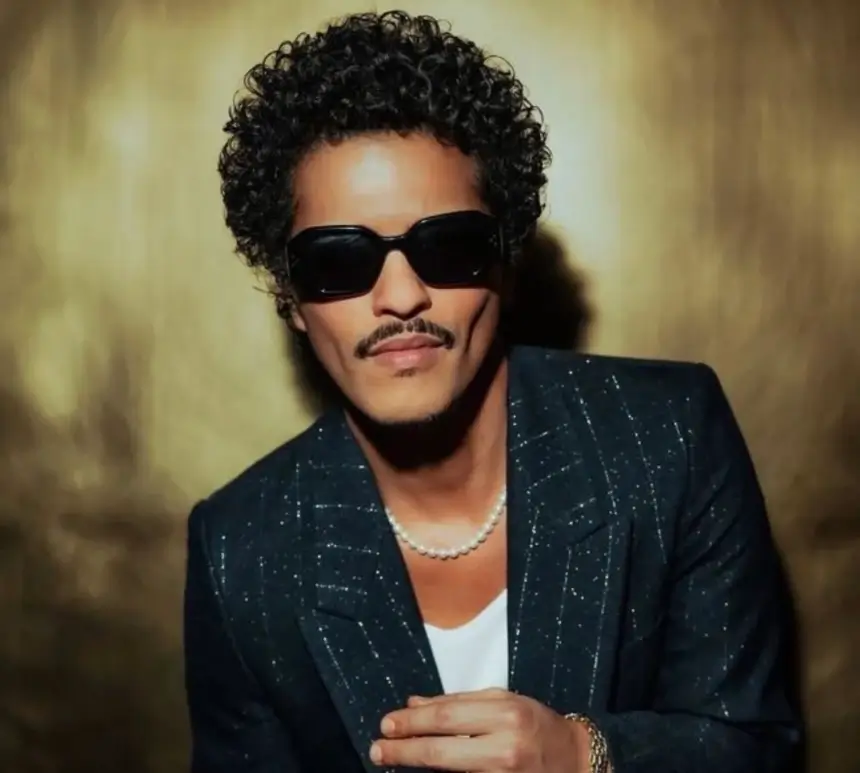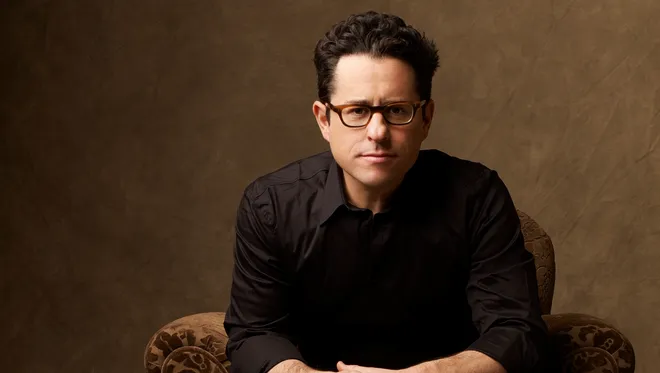In the sprawling landscape of celebrity interviews, few shows manage to balance chaos, candor, and comedy quite like Call Her Daddy. Hosted by Alexandra Cooper, the podcast has carved out a singular niche by getting some of the world’s most enigmatic figures to lower their defenses and show up as messy, relatable humans rather than untouchable icons.
When it was announced that Post Malone would be appearing on an episode, the buzz was immediate. Malone, after all, occupies a fascinating place in pop culture: a chart-topping musician who fuses rap, rock, and pop with apparent ease, yet remains one of the most self-deprecating, elusive, and endearingly odd celebrities of his generation.
The episode did not disappoint. Over the course of the conversation, listeners were treated to a raw, funny, and at times surprisingly emotional glimpse into the man behind the tattoos, the beer bongs, and the megahits.
Setting the Stage: Vulnerability as a Strength
Post Malone’s public persona has always been a strange balancing act. On one hand, he’s the creator of anthems like “Circles,” “Sunflower,” and “Rockstar”—songs that have dominated charts and parties alike. On the other, he’s a self-professed “weirdo” who seems far more comfortable playing beer pong with fans backstage than navigating the machinery of stardom.
From the opening moments of the Call Her Daddy episode, it was clear that Malone wasn’t there to deliver media-trained soundbites. He leaned into awkwardness, self-deprecating humor, and quiet admissions with a kind of refreshing transparency that’s become increasingly rare among celebrities.
He joked about his quirks. He swore casually, laughed at himself, and admitted to being nervous. This was not Post Malone the brand; this was Austin Post, the human being.
The Unlikely Intimacy of the Conversation
Alexandra Cooper, whose interviewing style oscillates between provocative and empathetic, allowed Malone the space to reveal himself organically. She didn’t press too hard when topics turned serious, but she didn’t let the conversation skim the surface, either.
Among the most compelling stretches of the interview were Malone’s reflections on mental health. He spoke candidly about his battles with anxiety and self-doubt, acknowledging that success had not inoculated him against the darker corners of the human experience. Fame, he suggested, can often amplify insecurities rather than erase them.
It was a striking reminder that behind the diamond chains and stage lights, Malone, like so many others, grapples with the quiet, gnawing pressures of living up to expectations—both external and internal.
On Creativity: Freedom Over Formula
Another highlight of the episode came when Malone discussed his creative process. His love for genre-blending, for bending musical rules, was on full display. He spoke passionately about wanting to make the music he loves without worrying about fitting into preordained categories.
“I just like making what I think sounds cool,” he shrugged at one point, a deceptively simple statement that, upon reflection, captured the essence of his musical career.
Rather than chasing trends, Malone has always trusted his instincts, and his crossover appeal—from hip-hop heads to country fans to indie kids—is proof of the authenticity that underpins his eclectic catalog.
This segment of the conversation also revealed a broader philosophical undercurrent: Malone’s rejection of rigid labels, whether in music or identity. It’s a mindset that feels particularly resonant in a cultural moment increasingly defined by hybridity and fluidity.
The Humor: Posty Being Posty
Of course, it wouldn’t be a Call Her Daddy episode—or a Post Malone appearance—without moments of sheer absurdity.
Malone recounted hilarious tales of drunken escapades, including a wildly funny story about a lost shoe that somehow became a three-hour existential journey through a Vegas casino. He riffed with Cooper about the strangest DMs he’s ever received, mused about his irrational fear of toilets (yes, really), and waxed poetic about his undying love for Olive Garden breadsticks.
This humor wasn’t forced or performative. It was woven seamlessly into the fabric of the conversation, serving as both a shield and a window into his soul. For Malone, laughter is not just a coping mechanism; it’s a worldview.
A New Chapter: Post Malone as Father and Fiancé
Perhaps the most poignant part of the episode came when Malone discussed fatherhood.
Recently engaged and a new father, Malone spoke about how becoming a dad had shifted his entire outlook on life. His voice cracked with emotion as he described wanting to be a better man—for his fiancée, for his daughter, and for himself.
“It’s about love now,” he said simply. “Everything else… it’s just noise.”
This evolution— from the rowdy party boy to the grounded family man—felt profound. It wasn’t packaged as a PR transformation; it was communicated through small, vulnerable admissions, offhand comments, and the unmistakable gravity in his voice.
Post Malone is not abandoning the parts of himself that fans fell in love with. Instead, he is expanding, growing, adding new dimensions to the portrait we’ve spent years assembling.
The Significance of the Episode
In the ecosystem of Call Her Daddy, where conversations often oscillate between raunchy confessions and moments of genuine intimacy, Malone’s episode was notable for its emotional resonance.
It wasn’t about shocking revelations or headline-grabbing soundbites (though there were plenty of funny moments that could be meme-ified). It was about authenticity—about a man showing up, imperfectly but completely, to a conversation.
In doing so, Malone managed to do something truly rare: he reminded us that behind every mythologized celebrity is a person trying, like all of us, to figure it out.
Final Reflections: The Humanity of Post Malone
There will be bigger interviews. There will be more viral moments. But Post Malone’s Call Her Daddy episode stands out because of its humanity.
It reaffirmed why Malone continues to occupy such a beloved place in the cultural imagination: because he never pretends to be anything other than what he is—a man whose contradictions (wild and tender, chaotic and wise, hilarious and heartbreaking) are not flaws, but testaments to his realness.
In a celebrity landscape often dominated by curated perfection, Post Malone’s messy, funny, vulnerable self feels not just refreshing—it feels necessary.
No comments yet.







